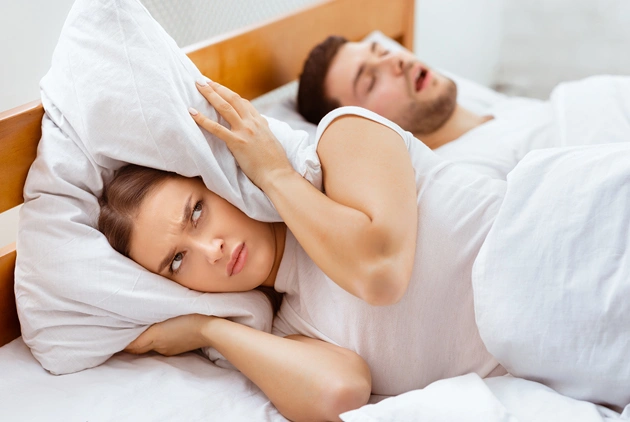We are not a registered Medicare/Medicaid Provider

Breathe Better Sleep Better Live Better
Sleep apnea is a common sleep disorder that impacts millions of individuals globally. It occurs when breathing is disrupted during sleep, resulting in frequent awakenings and potential health issues. This comprehensive guide will offer detailed information on sleep apnea, including its causes, symptoms, and available treatment options.
The skilled team at Dr. Charles Matarazzo, in Florham Park, NJ, takes pride in providing top-notch dental services to the local community. We are dedicated to ensuring that your dental health does not disrupt your quality of sleep.
What is Sleep Apnea?
Sleep apnea is a condition where breathing stops and starts repeatedly during sleep, leading to symptoms such as loud snoring, gasping or choking sounds, and excessive daytime sleepiness. There are three different types of sleep apnea.
- The most prevalent type of sleep apnea is Obstructive Sleep Apnea (OSA), which happens when the throat muscles relax and obstruct the airway.
- Central Sleep Apnea (CSA) occurs when the brain does not send signals to the muscles to breathe, resulting in pauses in breathing.
- Complex Sleep Apnea Syndrome (CompSA) is a combination of OSA and CSA.
Our team of skilled experts will collaborate with you to establish the most suitable treatment plan tailored to your specific needs and preferences.
How Sleep Apnea Affects Your Health and How to Treat It
What is Considered Sleep Apnea?
Sleep apnea is a condition where a person experiences repeated pauses in breathing while sleeping. These interruptions can disrupt sleep patterns and affect oxygen levels in the body, which may result in serious health issues. There are three main types of sleep apnea.
- Obstructive sleep apnea: This is the most common form, caused by relaxation of the throat muscles during sleep, leading to blockage of the airways and impaired breathing.
- Central sleep apnea: In this rare type, the brain fails to send signals to the muscles responsible for breathing, resulting in temporary cessation of breathing.
- Complex sleep apnea syndrome: Also known as treatment-emergent central sleep apnea, this condition involves a combination of obstructive and central sleep apnea.
Although loud snoring is commonly linked to sleep apnea, it is not a definitive sign of the condition. Risk factors for sleep apnea include obesity, excessive alcohol consumption, drug use, and genetic predisposition. Family history also plays a significant role, with individuals who have relatives with sleep apnea being more likely to develop the condition. The Sleep Foundation reports that sleep apnea affects people of all ages and demographics, but is more frequently seen in men.
What Are the Different Ways to Diagnose Sleep Apnea?
Sleep apnea is usually diagnosed using a polysomnogram, also called a sleep study, which can be done at home or at a sleep disorder center. This test tracks different activities during sleep, such as brain activity, breathing patterns, and oxygen levels. It also evaluates sleep stages, how often you wake up, instances of breathing pauses, snoring, and body position.
After the sleep study, a specialist meticulously reviews the gathered data to assess brain activity and physiological functions in order to identify any sleep disorders and suggest suitable treatment options.
If recommended, a dentist with expertise in sleep medicine works together with the specialist to offer treatment for obstructive sleep apnea through oral appliance therapy. We provide consultations for those interested in receiving sleep apnea oral appliances. Please don't hesitate to contact us for more information.
What Are the Common Signs of Sleep Apnea?
The symptoms listed below are commonly associated with sleep apnea, but having one or more of these symptoms does not automatically mean you have the condition. It is crucial to seek medical advice from your doctor for an accurate diagnosis.
- Loud snoring
- Daytime fatigue and lack of energy
- Headaches
- Restless sleep patterns
- Difficulty falling or staying asleep (insomnia)
- Waking with a dry or sore throat
- Gasping or choking sensations during the night
- Sudden shifts in mood
- Difficulty concentrating
- Frequent nighttime visits to the bathroom
What Treatment Options Are Available for Sleep Apnea in Florham Park, NJ?
In Florham Park, NJ, individuals seeking treatment for snoring and obstructive sleep apnea have several options available. These include surgical procedures, CPAP or BiPAP machines, and oral appliance therapy. Of these options, oral appliances are a minimally invasive approach that is often recommended for those with mild to moderate obstructive sleep apnea. These custom-designed appliances work by comfortably positioning the jaw during sleep, helping to improve airflow and oxygen levels.
It is important to consult with your sleep physician before making any treatment decisions to ensure the best approach for your condition. Once a treatment plan is in place, we can offer the necessary support to help you follow it consistently. If oral appliance therapy is suggested, it is crucial to make sure that the appliance is carefully designed and positioned to properly maintain your airway while you sleep.
The Dental Care Team in Your Area
Sleep apnea is a prevalent sleep disorder that can have severe health implications if not addressed. If you suspect you may have sleep apnea, it is crucial to seek treatment to prevent potential health issues like high blood pressure, heart disease, stroke, and diabetes. By receiving the appropriate treatment, you can enhance your sleep quality and lower your risk of developing these complications.
At your upcoming appointment with the skilled team at Dr. Charles Matarazzo, in Florham Park, NJ, rest assured that you will receive the high-quality care and guidance that you and your family deserve.

